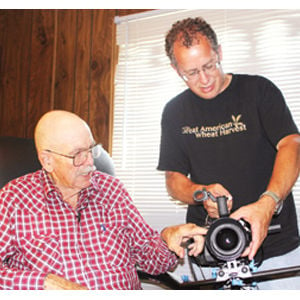By CHABELLA GUZMAN Staff Reporter
MINATARE — Farm Broadcaster Howard Hale has been following wheat harvests for more than five years.
Now, he has company in documentary filmmaker Conrad Weaver, director, producer and president of Conjostudios LLC of Maryland. Weaver is creating a documentary on wheat harvesting that will follow wheat from the seed to the table. Since January, he has been on the road filming across the wheat belt, which includes Nebraska.
Stops in the Panhandle included one in Chappell, with Jesse Smith at a grain elevator; with Meghan Spyke at Frenchman Valley Coop in Lodgepole; and Wednesday morning with Hale.
Hale was born and raised in Minatare. He was raised in agriculture and was selling ads at KOLT when he had the opportunity to become a broadcaster.
“The station manager said I was the only person there that knew about agriculture, and I moved over to broadcasting in 1985.” Hale said.
He did harvest reports and was doing part-time work for a station in Brush, Colo., when U.S. Custom Harvesters approached him in 1992 to do contract work.
“I did harvest reports from coast to coast and from border to border,” Hale said.
Weaver and his camera have also been moving across the wheat belt. He has had help from Jody Lamp and Melody Dobson, national executive co-coordinators of “The Great American Wheat Harvest” documentary.
“We are at the halfway point, halfway through with the harvest and halfway through with the film,” Dobson said.
Weaver has been following three harvest crews across the wheat belt — Deibert Harvesting; Tracy Zeorian, a custom harvester and president of the U.S. Custom Harvesters, Inc.; and Misener Family Harvesters.
Since the documentary started three years ago, Conrad and his wife, Jody Weaver, have met many harvesters.
“These are really hardworking people,” Jody said. “I’ve learned so much growing up in the city. I never thought of the process it took and all the partners involved to get my loaf of bread to the table.”
The growers themselves do some of the wheat harvesting, but many will hire harvesting crews. With time the equipment has become bigger and better, where GPS systems can pretty much drive a tractor.
“There are fewer harvesters, but they can cover more acres as the equipment has changed,” Hale said.
He added that it’s cost effective for a large farm to hire harvesters, with two to 10 machines, than have the machines sit around most of the year.
“Harvesting wheat has to be done on a timely basis. When it’s ready, you have to get it out of the fields,” Hale said.
Hale has been inducted into the hall of fame for U.S. Customs Harvesters, Inc.
The documentary is expected to be done in March, and Lamp said they are hoping to do theatrical presentations, including one in Scottsbluff.
For more information on the documentary, visit www.greatamericanwheatharvest.com.
